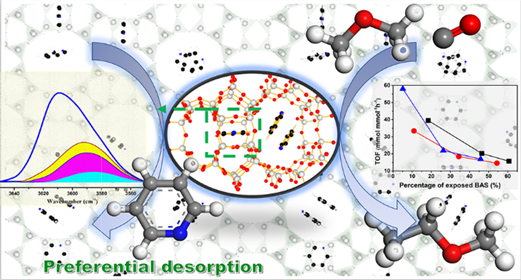Pyridine-modified MOR zeolite catalyst has attracted great attention in recent years due to its unique shape selectivity within 8-MR side pockets for DME carbonylation to methyl acetate (MA) and syngas conversion to ethylene.
Recently, a research led by prof. Zhongmin Liu and Peng Tian from Dalian institute of chemical physics of the Chines Academy of Sciencesinvestigated the adsorption/desorption behaviors of pyridine on MOR zeolites with varying Si/Al ratios and their impact on DME carbonylation,aiming to elucidate the pyridine modification-carbonylation activity relationships and develop high-performance catalyst.
This work was published in ACS catalysis on Mar 6.

Instead of the previously proposed selective adsorption of pyridine in 12-MR channels, pyridine is revealed to penetrate into 8-MR side pockets of MOR zeolites and interact with acidic hydroxyls therein. Upon heating, pyridine in pockets desorbs preferentially, likely arising from the lower stability of pyridine adspecies in constrained spaces. This well explains the observed increment of carbonylation activity following the increase of pretreatment temperature. Unprecedentedly high MA yield (7.2 mmol/h/g) has been achieved on pyridine-modified MOR (Si/Al=13.8) under controlled pyridine desorption conditions, resulting from the joint contributions of better diffusion properties and larger amount of active acid sites. Moreover, the catalytic activity of Br➢nsted acid sites within 8-MR pockets is demonstrated to be inhomogeneous, closely associated with their locations.
This work supported by Natural Science Foundation of China. (Text by Kaipeng Cao, Dong Fan)
Insights into the Pyridine-Modified MOR Zeolite Catalysts for DME Carbonylation. Kaipeng Cao, Dong Fan, Lingyun Li, Benhan Fan, Linying Wang, Dali Zhu, Quanyi Wang, Peng Tian*, Zhongmin Liu*, ACS Catal., 10(5):3372-3380, 2020.